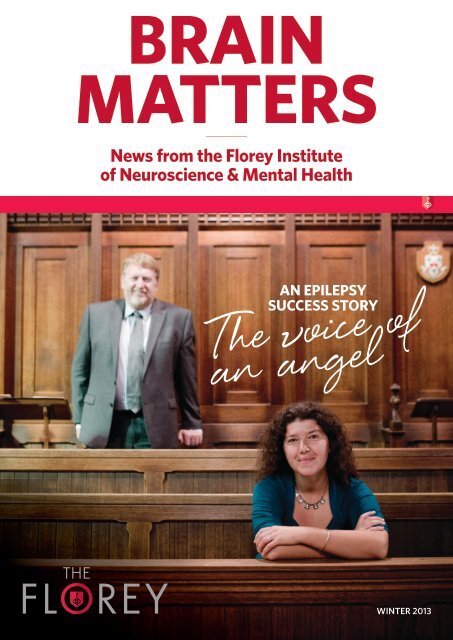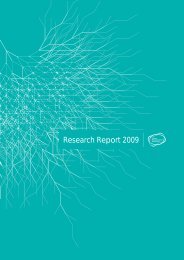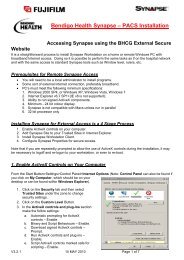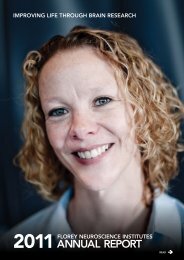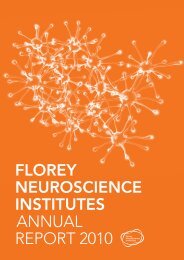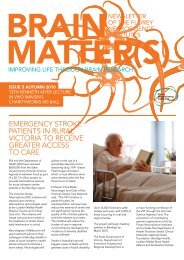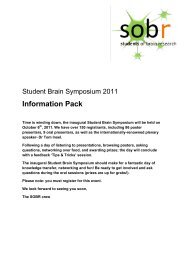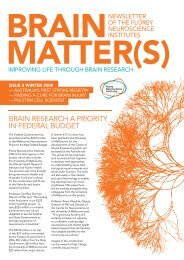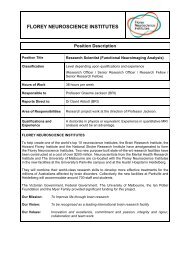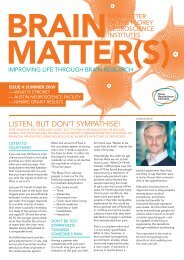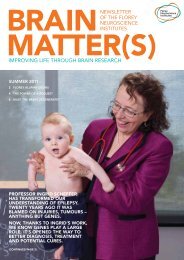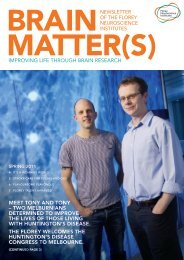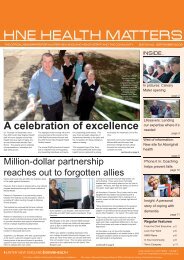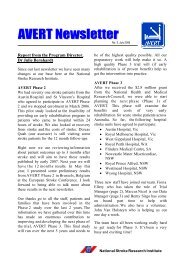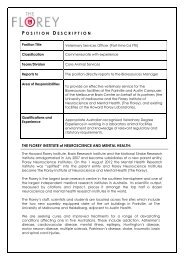Florey Brain Matters Winter - The Florey Institute
Florey Brain Matters Winter - The Florey Institute
Florey Brain Matters Winter - The Florey Institute
You also want an ePaper? Increase the reach of your titles
YUMPU automatically turns print PDFs into web optimized ePapers that Google loves.
BRAIN<br />
MATTERS<br />
;<br />
News from the <strong>Florey</strong> <strong>Institute</strong><br />
of Neuroscience & Mental Health<br />
AN EPILEPSY<br />
SUCCESS STORY<br />
<strong>The</strong> oice of<br />
an angel<br />
V<br />
WINTER 2013
2 BRAIN MATTERS WINTER 2013<br />
THE FLOREY INSTITUTE OF NEUROSCIENCE & MENTAL HEALTH<br />
3<br />
DIRECTORS REPORT<br />
;<br />
Dear friends of the <strong>Florey</strong>,<br />
Recently many of our supporters joined us for our<br />
Annual General Meeting when we held a very special<br />
event, acknowledging Victorian legends of neuroscience.<br />
Thirteen scientists and clinicians were celebrated for<br />
their contribution to the wellbeing of thousands of people<br />
around the world. A story about these extraordinary<br />
contributors is to the right. It was an inspiring evening for<br />
our up and coming neuroscientists.<br />
Speaking of our scientists, the <strong>Florey</strong> is now home to<br />
154 students studying for their honours, masters or PhD.<br />
Together with our more experienced researchers, we<br />
have 504 magnificent brains at work across our three<br />
campuses. When we include our support staff, the <strong>Florey</strong><br />
is home to nearly 600 people making us one of the most<br />
productive brain research facilities in the world. We<br />
collaborate with scientists from 34 countries.<br />
Following our amalgamation with the Mental Health<br />
Research <strong>Institute</strong> late last year, staff have settled into<br />
a truly collaborative environment. Work continues into<br />
mental health, neurodegeneration and other diseases<br />
common to our newly merged research teams. Once again<br />
I welcome our new readers to <strong>Brain</strong> <strong>Matters</strong>.<br />
You may have seen some media coverage involving our<br />
talented neurologists who are working in the field of<br />
epilepsy. Both Professors Ingrid Scheffer and Graeme<br />
Jackson have hit the headlines with inspiring stories<br />
demonstrating how our research affects real lives. You can<br />
read more on these remarkable professionals, here in this<br />
edition of <strong>Brain</strong> <strong>Matters</strong>.<br />
For those who would like more information about the<br />
<strong>Florey</strong> <strong>Institute</strong> of Neuroscience and Mental Health,<br />
please feel free to visit our website to read the new Annual<br />
Report or call us for a copy on (03) 8344 6942.<br />
Warm regards,<br />
Prof Geoffrey Donnan, AO<br />
Director, the <strong>Florey</strong> <strong>Institute</strong> of Neuroscience<br />
& Mental Health<br />
Acknowledging the legends<br />
<strong>The</strong> trailblazers of brain research were recently acknowledged<br />
at a special function hosted by the <strong>Florey</strong> and the University<br />
of Melbourne.<br />
Some eight living legends of Melbourne’s neuroscience community<br />
attended, as well as families and colleagues of those who had<br />
passed away. Representatives accepted gifts in a ceremony before<br />
an audience of young neuroscientists who recognised the lifechanging<br />
contributions the ‘legends’ had made.<br />
Notably, <strong>Florey</strong> founder Emeritus Professor Derek Denton attended<br />
on the eve of his 89th birthday. Our much admired former director<br />
Professor Fred Mendelsohn was recognised for his scientific<br />
achievements and leadership.<br />
Victorian neuroscience legends, colleagues and Mr Harold Mitchell AC, celebrate their<br />
recognition on the glass walls of our foyer.<br />
Those who were honoured had either retired or had made an<br />
historic impact or discovery, ensuring those who are still working<br />
in the field of neuroscience continue to strive for excellence!<br />
<strong>The</strong>re was an interesting mix of neurologists, psychiatrists and<br />
fundamental scientists honoured.<br />
Professor David Copolov and the late John Cade, Eric Cunningham<br />
Dax and Sydney Sunderland were remembered for their research<br />
and advocacy of those living with mental illnesses while Marelyn<br />
Wintour-Coghlan, John Coghlan and Geoff Tregear were<br />
acknowledged for ground-breaking lab-bench science at the <strong>Florey</strong>.<br />
Vice Chancellor of Monash University, Prof Ed Byrne, Austin<br />
neurologist Peter Bladin and the late Leonard B Cox and E Graeme<br />
Robertson were also recognised for their enormous contribution.<br />
<strong>The</strong>ir images and achievements are displayed in the foyers of<br />
both the <strong>Florey</strong>’s campuses – in Parkville and Heidelberg. We have<br />
ensured there is plenty of room to extend the honour roll as our<br />
scientists break new ground and, perhaps, go down in history.<br />
OUR COVER<br />
;<br />
Sally Watt is a singer with the Canterbury Fellowship. She is<br />
photographed here in Trinity Chapel with <strong>Florey</strong> neurologist,<br />
Professor Graeme Jackson, who has helped Sally regain<br />
her beautiful voice after brain surgery to end her epilepsy.<br />
See page five for more.<br />
Genes, genes and more genes<br />
surgery for epilepsy<br />
;<br />
Professor Scheffer talks to Vicki, 25, who was diagnosed with epilepsy at age five. According to Vicky: “I didn’t even contemplate having children because I don’t want them to<br />
have (epilepsy) but this allows the opportunity because I could eliminate the gene from any possible children that I have”. Photo credit Joe Castro AAP.<br />
Professor Ingrid Scheffer and her collaborators have enjoyed a high<br />
profile couple of months, announcing the identification of three new<br />
genes responsible for common and devastating forms of epilepsy.<br />
In the first of two announcements through the journal Nature Genetics,<br />
Professor Scheffer has published the discovery of a new gene that<br />
causes some cases of the most common form of epilepsy.<br />
Focal epilepsy accounts for 60 per cent of all cases.<br />
According to Prof Scheffer, a senior principal research fellow at the<br />
<strong>Florey</strong>, focal seizures come from one part of the brain and are generally<br />
considered to be due to a structural abnormality such as a brain<br />
injury or tumour. All seizures are caused by electrical disturbances<br />
in the brain but “partial” or focal seizures occur when this electrical<br />
activity originates in a specific area of the brain. A small proportion<br />
of people with abnormalities of this newly discovered gene also have<br />
intellectual disability, psychiatric or autism spectrum disorders.<br />
Prof Scheffer, who is also an internationally renowned paediatric<br />
neurologist, says the discovery of the gene will lead to improved<br />
clinical care as:<br />
• a genetic test will be conducted, reducing the need for other tests<br />
• accurate genetic counselling will be offered<br />
• in future, specific therapeutic drugs will be developed.<br />
A large collaborative research team worked on the discovery,<br />
including <strong>The</strong> <strong>Florey</strong>, <strong>The</strong> University of Melbourne and University<br />
of South Australia, the Belgian Free University of Brussels and<br />
Leiden University Medical Center in <strong>The</strong> Netherlands. Clinical<br />
collaborators worked together from across Australia, Europe and<br />
Canada. <strong>The</strong> results are published in the journal Nature Genetics.<br />
And in further news, Prof Scheffer has discovered two new genes<br />
causing severe seizure disorders that begin in babies and early<br />
childhood. <strong>The</strong> finding will also lead to new tests to diagnose these<br />
conditions, and promises to lead to improved outcomes.<br />
Epileptic encephalopathies are severe seizure disorders occurring in<br />
infants and children. Those affected experience slow development and<br />
intellectual problems.<br />
“<strong>The</strong>se children have devastating disorders. Finding the cause is the<br />
first step in developing targeted treatments. Overall, our findings<br />
have important implications for making a diagnosis in patients,<br />
optimising therapy and genetic counseling for families,” she said.<br />
In the study, researchers analysed the genes of 500 children who<br />
have epileptic encephalopathies.<br />
“This is a very exciting breakthrough which could lead to dramatic<br />
benefits in the lives of the children who suffer this condition.”<br />
A genetic test will now become a diagnostic tool for children with<br />
severe epilepsies and enable genetic counseling in their families.<br />
Collaborators on this second study included geneticists from the<br />
University of Washington, US and paediatric neurologists from<br />
around Australia, New Zealand, Denmark and Israel. <strong>The</strong> study<br />
was funded by the National Health and Medical Research Council,<br />
Australia and the National <strong>Institute</strong>s of Health, US.<br />
FAST FACT<br />
;<br />
Professor Ingrid Scheffer has been awarded the Peter Emil<br />
Becker Prize while visiting Austria. <strong>The</strong> prize is for outstanding<br />
contribution to paediatric neurology and was awarded at the<br />
39th Annual Meeting of the Society of Neuropaediatrics.<br />
Congratulations Ingrid!<br />
Improving lives through brain research<br />
Donate to the <strong>Florey</strong> at www.florey.edu.au
4 BRAIN MATTERS WINTER 2013<br />
THE FLOREY INSTITUTE OF NEUROSCIENCE & MENTAL HEALTH<br />
5<br />
Time-critical stroke care for<br />
country patients<br />
;<br />
Singer’s voice saved after<br />
surgery for epilepsy<br />
;<br />
<strong>The</strong> imaging study has also revealed secrets of the way some of us<br />
sing and how trained singers use different pathways, according to<br />
Prof Jackson.<br />
“Mug singers sing with their language systems, which is why it<br />
doesn’t sound so good,” he says.<br />
“Intermediate singers swap and use language-like areas on the other<br />
side of their brain. Expert singers rearrange it yet again. <strong>The</strong> epileptic<br />
process meant Sally had learned to sing in a way no one else had.”<br />
Prof Jackson said findings from the research project, spurred by Sally’s<br />
case and involving the <strong>Florey</strong>, Austin and Royal Melbourne hospitals,<br />
had unlocked the secrets of brain plasticity and how singers “find<br />
their voice”. Associate Professor Sarah Wilson, a research fellow at<br />
the <strong>Florey</strong> and a behavioural neuroscientist with the University of<br />
Melbourne has been a vital contributor to the ongoing research.<br />
We’ve reached this amazing period<br />
where we can see the brain thinking.<br />
Country patients suffering a suspected stroke can now receive<br />
expert neurological opinion from Melbourne – without leaving<br />
their hospital bed.<br />
<strong>The</strong> <strong>Florey</strong> is pioneering the use of innovative technology - highcapacity<br />
broadband - to improve patient care. City neurologists<br />
can now offer time-critical advice to rural and regional doctors<br />
treating emergency stroke patients.<br />
Following successful testing of the program with Bendigo Health,<br />
the service is set to expand into the Loddon Mallee region over the<br />
next two years and to other parts of Victoria by 2018.<br />
<strong>The</strong> neurologists can see vital data, including brain imaging, through<br />
high quality audio-visual equipment to ensure fast and effective<br />
remote consultations. As a result, a greater number of treatment<br />
options are available for patients. Fast and appropriate treatment<br />
results in the best chance for a successful outcome.<br />
According to Professor Geoff Donnan, Director of the <strong>Florey</strong>:<br />
“<strong>The</strong> <strong>Florey</strong> has links with a network of Melbourne-based<br />
neurologists to ensure time-critical care is offered to patients<br />
24-hours a day.”<br />
“<strong>The</strong> service is vital for patients because the sooner treatment is<br />
offered, the better the outcome for the person involved – it could<br />
prevent years of rehabilitation or disability.”<br />
FAST FACT #1<br />
;<br />
In Australia, over 50,000 people suffer a stroke each year<br />
and approximately 250,000 Australians are living with the<br />
consequences of stroke. It is the leading cause of long-term<br />
adult disability with about 50 per cent of survivors dependent<br />
on others to help them with everyday living.<br />
FAST FACT #2<br />
;<br />
<strong>The</strong>re have been significant advances in both drug and<br />
physical treatments for patients with acute stroke that have<br />
improved survival and reduced disability. Rapid diagnosis<br />
provides the best opportunity for clinicians to intervene early.<br />
<strong>Florey</strong> researchers have found that patients experience fewer<br />
disabilities and an improvement in their quality of life when<br />
appropriate treatment and rehabilitation is delivered early.<br />
<strong>The</strong> program is supported by investment from partners including<br />
the Commonwealth’s Department of Health – Victorian Stroke<br />
Clinical Network, Monash University, Polycom, Telstra, Loddon<br />
Mallee Rural Health Alliance, Ambulance Victoria, National Stroke<br />
Foundation, the Stroke Society of Australia, Bendigo Health,<br />
Mildura Base Hospital, Swan Hill District Hospital and Echuca<br />
Regional Health.<br />
<strong>The</strong> program is expanding through $400,000 of state funding into<br />
the Loddon-Mallee region over the next two years and is set to<br />
roll out to 16 Victorian regional and rural hospitals over five years<br />
thanks to funding from the federal government of $7.2 million.<br />
It is the brainchild of <strong>Florey</strong> stars, neurologist and program<br />
director Professor Chris Bladin and epidemiologist and head<br />
of our Stroke Division’s Public Health unit, Associate Professor<br />
Dominique Cadilhac.<br />
“We’ve seen some significant improvements to treatment<br />
statistics at Bendigo Health,” says Prof Cadilhac. “<strong>The</strong> number of<br />
stroke patients treated has increased by eight per cent since we<br />
started a pilot three years ago and there has been a 40 per cent<br />
improvement in the time it takes to treat a stroke patient once they<br />
arrive in the country hospital’s emergency department,” she says.<br />
Professor Graeme Jackson and singer, Sally Watt, in Trinity Chapel where Sally sings<br />
music from the 15th century with the Canterbury Fellowship.<br />
<strong>The</strong> <strong>Florey</strong>’s imaging team has used state-of-the-art imaging to save a<br />
young woman’s ability to sing. Sally Watt was a talented professional<br />
singer who was seriously incapacitated by epileptic seizures. When<br />
medication failed to control the disease, Sally reluctantly agreed to<br />
have surgery to remove part of her brain. What happened next is quite<br />
remarkable and has provided rich fodder for our researchers who are<br />
gaining new insights into the processes of language and song.<br />
Since having a portion of her right temporal lobe removed to stop<br />
the epileptic seizures, Sally Watt’s brain has rewired itself. Sally,<br />
35, had a 3cm-wide portion of brain surgically removed in a right<br />
anterior temporal lobectomy.<br />
She can now sing pitch-perfect and play the piano from memory.<br />
“When I found out the part of my brain where the seizures were<br />
happening also controlled musicality, I freaked out,” she said.<br />
“Music was the only thing I was good at, so there was no way I was<br />
going to lose that.”<br />
Prof Jackson led a team of 10 researchers to isolate the parts of<br />
Sally’s brain involved in singing, to decide if neurosurgeons could<br />
avoid removing that part of the brain.<br />
<strong>The</strong> <strong>Florey</strong> was perfectly positioned to conduct such a study with<br />
sophisticated imaging equipment, physicists, neurologists and<br />
radiographers able to analyse the scanned brain.<br />
<strong>The</strong> tests involved Sally imagining she was singing while she<br />
was inside an MRI machine. This revealed the singing pathways<br />
travelling around the brain.<br />
“We can now look at the brain of someone in the scanner and tell<br />
how good their pitch is going to be by what patterns they use when<br />
they imagine singing.<br />
“And we can probably tell how good a singer they are.”<br />
In Sally’s case, the decoupling of the language and singing networks,<br />
through major brain surgery, led to the brain reorganising itself.<br />
Sally reports that the surgery has controlled the seizures and<br />
allowed her to continue pursuing music.<br />
“<strong>The</strong> surgery totally rearranged my thinking, but it’s better. I can<br />
play pieces on the piano from memory just by singing the piece in<br />
my head. It’s so weird, but wonderful.”<br />
While struggling to describe what happens, Sally looks back<br />
and compares it to pre-surgery when she says she took a very<br />
intellectual approach to music, visualising the keyboard of a piano<br />
to find notes and to follow music. It is now instinctive.<br />
Sally sings at <strong>The</strong> University of Melbourne’s Trinity College in the<br />
Canterbury Fellowship, singing music from the Renaissance and<br />
other periods.<br />
Professor Graeme Jackson.<br />
It is<br />
increasingly<br />
recognised that<br />
epilepsy is a<br />
disease of brain<br />
networks and that<br />
seizures travel<br />
along pathways,<br />
selectively<br />
disrupting<br />
particular<br />
functions.<br />
Improving lives through brain research<br />
Donate to the <strong>Florey</strong> at www.florey.edu.au
6 BRAIN MATTERS WINTER 2013<br />
THE FLOREY INSTITUTE OF NEUROSCIENCE & MENTAL HEALTH<br />
7<br />
A survivor sets a<br />
superb example<br />
;<br />
Since our last visit to Leongatha, <strong>Florey</strong> bequestor Mrs<br />
Evelyn Fawcett has been continuing to pump iron twice<br />
weekly at her local gym and now has bone density to rival<br />
that of her children...and perhaps even her grandchildren!<br />
Budding scientists learn<br />
about mental illness and<br />
neuroscience careers<br />
Please turn my support into<br />
hope for Alzheimer’s disease,<br />
stroke, Parkinson’s disease,<br />
depression and other<br />
mental illnesses.<br />
;<br />
A survivor of breast and bowel cancer, Evelyn keeps a<br />
close eye on her family’s health – a big job, considering<br />
that she has three sons, seven grandchildren and six greatgrandchildren!<br />
From Perth to the Pilbara and across to<br />
Gippsland, Evelyn is challenged to provide a good example<br />
and promote excellent health as an act of gratitude, for not<br />
succumbing to terminal illness.<br />
First name:<br />
Surname:<br />
Address:<br />
Supporter Matt’s marathon<br />
for mental health research –<br />
icy water no barrier<br />
;<br />
<strong>The</strong> <strong>Florey</strong> is truly fortunate to be supported by community<br />
fundraisers who often go far and beyond normal human endurance<br />
to help us continue our brain research. Here we meet Matt Harry,<br />
38, an open water swimmer who is pushing all boundaries in the<br />
name of mental health.<br />
Matt has a fantastic blog, describing his preparation for the<br />
“Everest” for all swimmers, to cross the English Channel in August.<br />
Matt is raising funds to help our research into mental illness. Here<br />
are some words from his blog about the path to the big swim:<br />
“It is the task of any individual intent on living an interesting and<br />
fulfilling life to continually find ways to create new memories.<br />
Some of these memories can be created in an instant with nothing<br />
more than deciding to act on an impulse; others require prolonged<br />
planning, dedication, sacrifice and hard work. And so it goes when<br />
the memory you desire is that of successfully swimming across the<br />
English Channel.<br />
“For the past two winters I have been undertaking cold water<br />
acclimation which really is nothing more than a fancy term for<br />
turning your brain off and diving into the (Port Phillip) bay in the<br />
middle of winter to swim for as long as you can survive. <strong>The</strong> most<br />
challenging of these were the pre-work swims, most of which took<br />
place for me this past winter on a Friday morning with the alarm<br />
clock blazing away at 5.30am. <strong>The</strong> problem with an alarm clock is<br />
that what seems reasonable when you set it seems absurd when<br />
it goes off.<br />
“Family and relationships are as important to me as the challenge<br />
I have set myself and this is something that I have found pretty<br />
challenging. How do we know if we are doing enough in all areas to<br />
get from life all that we want My answer to that is pretty simple –<br />
we don’t! All we can do is walk the line and hope that we are doing<br />
enough. Time will reveal all.<br />
“Having had close family experiences with mental illness I am<br />
aware of just how vital a healthy mind can be to one’s ability to<br />
enjoy and live life for all it’s worth. So please, get on-board, click on<br />
the link (below) and chip-in for the folks working towards cures and<br />
greater understanding of these debilitating illnesses.”<br />
And so we at the <strong>Florey</strong> say “Swim strong, Matt and thank<br />
you!”. If you want to read of his tales along the way (especially<br />
the story about the jellyfish) please visit his blog online at<br />
www.marathonforthemind.wordpress.com<br />
<strong>The</strong>re have been nervous moments in the family’s health<br />
history as epilepsy robbed her grandson of fruitful years of<br />
school before he outgrew the brain disorder in adulthood.<br />
Traced back to her husband’s father who is reported to have<br />
suffered grand-mal seizures, which Evelyn feels were never<br />
properly diagnosed, the epilepsy has not made a further<br />
appearance anywhere in the family.<br />
Evelyn is greatly relieved about the absence of the condition,<br />
her grandson’s recovery and her own.<br />
Evelyn’s last word on the subject ... “Without research, you<br />
can’t find out anything!”<br />
Without research,<br />
you can’t find out anything!<br />
If you would like to find out how you too can put family first,<br />
and still leave a bequest to help advance research at the<br />
<strong>Florey</strong>, please contact Hazel Westbury – Donor and Alumni<br />
Relations: by email : hazel.westbury@florey.edu.au , or by<br />
phone on (03) 8344 9678, or mobile: 0438 411 145<br />
Students visit the DAX Centre.<br />
<strong>The</strong> <strong>Florey</strong>, together with the Dax Centre and the Mental Illness<br />
Fellowship provides an innovative program for school kids at our<br />
Parkville campus, exploring mental health issues. <strong>The</strong> students<br />
learn about mental illness from a personal viewpoint, a<br />
neuropsychological and clinical perspective and through the<br />
artwork exhibited at the Dax Centre gallery.<br />
One of our neuroscientists presents current research into<br />
schizophrenia or major depression. As well, a volunteer mental<br />
health advocate talks about the experience of living with mental<br />
illness and their recovery – an important part of the day as it helps<br />
to demystify youth mental health issues. Finally, the group takes a<br />
tour of the Dax Centre gallery, guided by a mental health clinician.<br />
This year we have already conducted over 70 Mindfield sessions<br />
with more than 50 schools participating. Next year we hope to<br />
offer the program to an even greater number.<br />
Those who have experienced the Mindfields program comment<br />
that the program makes psychology and health issues real and<br />
relevant to their students, and that our program emphasises that<br />
mental illness is about people, not statistics.<br />
Katherine Neall from Edenhope College said “I know that some of<br />
the things my students learnt at the Dax Centre will stay with them<br />
for the rest of their lives. It was definitely worth the five hour drive<br />
to get there.”<br />
If you are interested in the Mindfields program, please visit<br />
www.daxcentre.org where you can book online or arrange to speak<br />
to an educator Wednesday to Friday.<br />
I know that some of the things<br />
my students learnt at the<br />
Dax Centre will stay with them<br />
for the rest of their lives.<br />
It was definitely worth the<br />
five hour drive to get there.<br />
Katherine Neall from Edenhope College<br />
State:<br />
Email:<br />
Postcode:<br />
I would like more information about making automatic<br />
regular donations.<br />
I would like more information about remembering the<br />
<strong>Florey</strong> <strong>Institute</strong> of Neuroscience & Mental Health in my will.<br />
I would like updates on brain research by mail by email<br />
Enclosed is my cheque money order<br />
or debit my<br />
Mastercard Amex Visa Diners<br />
Card number:<br />
Expiry date:<br />
Signature:<br />
Thank you for your valuable support. All donations are tax deductable.<br />
I would like to donate $<br />
Ways to donate:<br />
• Call our freecall credit card donation line on 1800 063 693<br />
• Fax your donation to us on (03) 9035 3107<br />
• Online at www.florey.edu.au<br />
• Send your donation to the <strong>Florey</strong> <strong>Institute</strong> of Neuroscience & Mental<br />
Health, Reply Paid 83037, 30 Royal Parade, Parkville, VIC 3052<br />
<strong>The</strong> <strong>Florey</strong> <strong>Institute</strong> of Neuroscience & Mental Health records information about its<br />
supporters that includes address and donation details, and is used solely by the <strong>Institute</strong><br />
but is not sold, traded or passed on to any third parties.<br />
Improving lives through brain research<br />
Donate to the <strong>Florey</strong> at www.florey.edu.au
Festival of Ideas –<br />
Questions of brains<br />
and minds for a healthy<br />
society<br />
Date: Saturday October 5:<br />
9.30am -6.15pm<br />
A special day when we join with<br />
the University of Melbourne for<br />
stimulating discussion about<br />
the role of the brain in human<br />
behaviour. Hosted by ABC<br />
broadcaster, Norman Swan, the<br />
day promises to be amazing. It<br />
will be suitable for a general public<br />
audience. More details on the<br />
<strong>Florey</strong> website closer to the day.<br />
<strong>The</strong> Festival of Ideas is a University<br />
of Melbourne initiative. Director,<br />
Professor Fiona Stanley AC, will<br />
lead participants on a stimulating<br />
journey through key health<br />
issues of concern to Australians.<br />
Prof Stanley and the festival<br />
team are assembling a powerful<br />
international guest list to deliver<br />
keynote speeches, debates,<br />
performances and fringe activities.<br />
Leading Australian academics,<br />
intellectuals and thought leaders<br />
will engage with audiences and<br />
participants on the health of our<br />
bodies, minds, society, economy<br />
and democracy.<br />
NEWS & EVENTS<br />
;<br />
Parkinson’s lecture with Professor Mal Horne<br />
When, who and which…Advanced therapies in Parkinson’s disease.<br />
Date: Wednesday, July 17: 6.30pm<br />
Where: Ian Potter auditorium, Melbourne <strong>Brain</strong> Centre, 30 Royal Pde,<br />
Parkville. (Disabled and other parking under the building).<br />
This lecture will address the question of when to use therapies, such<br />
as deep brain stimulators, apomorphine, and DuoDopa. What benefits<br />
can be expected and what are the pros and cons of each<br />
<strong>The</strong> lecture will be recorded and posted on our website for those<br />
unable to attend.<br />
Feel like an extreme challenge<br />
Be part of the action and join the<br />
One in Five Extreme Challenge team.<br />
Want to get fit, meet new people,<br />
join old friends – all while supporting<br />
mental health research at the <strong>Florey</strong><br />
This year’s looks like being the biggest team with over 60 people<br />
already entered for one or both of the following events.<br />
September 21: <strong>The</strong> Surf Coast Century covers 100km as a trail run in<br />
Anglesea, Victoria. You can participate as a member of a relay team or<br />
for the truly brave, you can tackle it SOLO.<br />
October 13: <strong>The</strong> Melbourne Marathon offers a range of options –<br />
from the 3km walk to the VERY EXTREME 42.2km marathon.<br />
Perhaps you will enter both events<br />
If you are tempted, need convincing or simply want some more<br />
information please email olivia@oneinfive.com<br />
Melbourne <strong>Brain</strong><br />
Symposium<br />
Date: October 25-29<br />
An academic meeting of<br />
neuroscientists from around<br />
the world, hosted by the<br />
<strong>Florey</strong> and the Melbourne<br />
Neuroscience <strong>Institute</strong>.<br />
<strong>The</strong> 2013 Culinary<br />
Charity Challenge<br />
- Melbourne versus<br />
Sydney<br />
Date: Friday August 16: 6.30pm<br />
Where: Palladium at Crown<br />
Australia’s greatest culinary event<br />
is back – a fundraiser for the <strong>Florey</strong><br />
and a feast for the tastebuds.<br />
Book now at<br />
<strong>Florey</strong>@perfectevents.com.au or<br />
(03) 9384 1190.<br />
Earlybird discounts available<br />
until June 30.<br />
THANK YOU<br />
;<br />
<strong>The</strong> <strong>Florey</strong> thanks our recent major donors<br />
Michael Aitken • Mrs R Andre • Raechel & Danny Ballinger • Graeme Bate • Sandra Benjamin OAM • Bethlehem Griffiths Research Foundation • BP<br />
Employee Matching Fund • Robert Braby • Bupa Health Foundation • Elizabeth Butt • Jarrod Byham • Suzi Carp • <strong>The</strong> CASS Foundation Ltd • Edward &<br />
Diana Cherry • Faye Clarke • Deirdre Collier • Community Enterprise Foundation • Rebecca L Cooper Medical Research Foundation • Michaelle Dart •<br />
Dr & Mrs C M Deeley • Craig Drummond • Evelyn Fawcett • Rita Ferguson • Rosemary Geer • Giant Steps Sydney • <strong>The</strong> Hon Alan Goldberg AO QC •<br />
Illabarook Pty Ltd • Estate of the late Pauline Marie Johnston • Mr A P Kelly • Joy Lambert • Lions Club of Somerville • Brian Little • <strong>The</strong> Lochtenberg<br />
Foundation • Ian Marks • Alexander McMillan • MND and Me Foundation • Motor Neuron Disease Association of Victoria • Dr Bruce & Judy Munro<br />
• Bruce Murrie • Sid & Fiona Myer Family Foundation • Sue O’Neill & Enid Telford • Miss M O’Sullevan • Jillian Pratt • RobMeree Foundation • Rotary<br />
MS Awareness Committee • Donald Sanders AO • Sessions Funeral Services • ShareGift Australia • Robert & Elisabeth Sinclair • Miss P Smart •<br />
Pauline Speedy • Dr Takako Subocz • Sammy Taleb • Jean Thomas • Dr Alan Wade Alzheimers Research Fund • Stan & Judith Wallis • Keith Williams<br />
• Lyn Williams • Margaret Wilson • Lady June Zeidler<br />
Donations in memory of<br />
Tom Beer<br />
Nathan Black<br />
Dimitrus (James) Evangelou<br />
Joan Margaret James<br />
John Fyfield<br />
Silvio Gionfriddo<br />
Gifts in celebration of<br />
Mary Lux’ 50th birthday<br />
For more information contact the Editor, Amanda Place:<br />
amanda.place@florey.edu.au or +61 411 204 526<br />
Visited the <strong>Florey</strong> website lately Go to florey.edu.au<br />
Find us on Facebook and Twitter at our website: florey.edu.au<br />
<strong>The</strong> <strong>Florey</strong> <strong>Institute</strong> of Neuroscience & Mental Health is the amalgamation<br />
of the Howard <strong>Florey</strong> <strong>Institute</strong>, the <strong>Brain</strong> Research <strong>Institute</strong>, <strong>The</strong> Mental<br />
Health Research <strong>Institute</strong> and the National Stroke Research <strong>Institute</strong>.<br />
Articles and photographs that appear in this publication remain the<br />
property of the <strong>Florey</strong> <strong>Institute</strong> of Neuroscience & Mental Health and may<br />
not be reproduced without permission.<br />
Copyright © 2013


